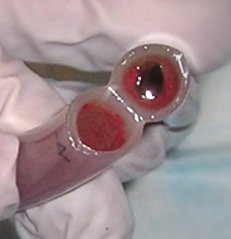Retained Blood Complex Leads to Impaired Cardiac and Respiratory Recovery
Bleeding is common after heart surgery. Patients with bleeding after heart surgery clearly have worse outcomes. But why? Theoretically, if a patient is bleeding and the chest tubes adequately drain the blood from around the heart and lungs while coagulation is restored and the blood products replaced, there should not be much impact on outcomes. This is clearly not the case, however. For example in a recent study by Chistensen and colleagues, postoperative hemorrhage (measured as chest tube drainage loss) exceeding 200 mL/h in 1 hour or 2 mL/kg for 2 consecutive hours occurring within 6 hours after cardiac surgery is associated with higher 30-day mortality and stroke, mechanical ventilation > 24 hours, ICU stay and re-exploration.(1)
Some have suggested that the poor outcomes could be a reaction to transfusions. Yet, in a recent study by Dixon and colleagues, the investigators looked at various variables including the possibility that drains are inefficient at clearing blood from the chest and how retained blood may compromise cardiac and lung function.(2) Using multivariate analysis they found that blood transfusion was not an independent predictor of mortality, while chest tube drainage was, in fact, the strongest independent predictor of mortality. In strong correlation with bleeding they found a reduction in cardiac and respiratory function, leading them to conclude that insufficient chest drainage due to tube occlusion may be the link that explains the poor outcomes. This may be no surprise to many surgeons and nurses, all of whom have seen chest tube failure due to clogging and a majority of whom have seen adverse patient outcomes from clogging.(3)
This begs the question: Perhaps it’s not what drains that hurts the patient, it’s what does not drain?
1. Christensen, M.C., Dziewior, F., Kempel, A., and von Heymann, C. 2012. Increased chest tube drainage is independently associated with adverse outcome after cardiac surgery. J Cardiothorac Vasc Anesth 26:46-51.
2. Dixon, B., Santamaria, J.D., Reid, D., Collins, M., Rechnitzer, T., Newcomb, A.E., Nixon, I., Yii, M., Rosalion, A., and Campbell, D.J. 2012. The association of blood transfusion with mortality after cardiac surgery: cause or confounding? Transfusion.
3. Shalli, S., Saeed, D., Fukamachi, K., Gillinov, A.M., Cohn, W.E., Perrault, L.P., and Boyle, E.M. 2009. Chest tube selection in cardiac and thoracic surgery: a survey of chest tube-related complications and their management. J Card Surg 24:503-509.
